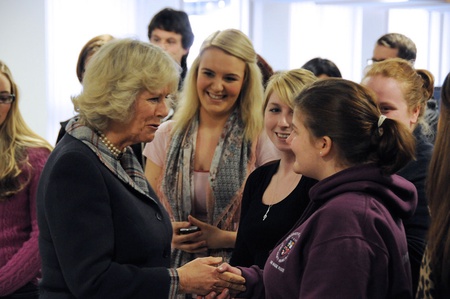Her Royal Highness The Duchess of Rothesay visited the University of Aberdeen’s School of Education today (April 18) to see how the institution prepares new teachers to enter the profession.
The University’s Inclusive Practice Project has developed new approaches to training teachers to ensure that they have a greater awareness and understanding of the educational and social problems that can affect children’s learning, and strategies they can use to support and deal with such difficulties.
Researchers at Aberdeen helped to compile a groundbreaking report highlighting the importance of reforming teacher education to bring about better outcomes for students with disabilities and learning difficulties, a challenge that is faced in many countries. One of its lead authors, Professor Lani Florian, was invited to the White House in Washington to share the findings when the US government reviewed elementary and secondary education.
The Duchess met Professor Florian, her colleague Do Coyle, a Professor of Learning Innovation, and some of the trainee teachers benefitting from this new approach to education.
On the day of the visit the University of Aberdeen hosted the Scottish Teacher Education Committee (STEC) annual conference which will see hundreds of teachers from around the country visit the King’s College Campus.
After meeting with trainee teachers, the Duchess moved on to the Department of Music, situated in the School of Education, where she met staff and students including Head of Department Dr David Smith and the composer Professor Paul Mealor, whose music was performed at last year’s Royal Wedding and has been sung by the Military Wives Choir.
Her Royal Highness was also introduced to fourth-year music student Paul Murray who has overcome four major brain surgeries and multiple sclerosis to continue playing the piano. After his illness left him partially paralysed, the talented musician had to learn the more difficult technique of left-hand only repertoire to continue performing.
The visit concluded with a performance by members of King’s College Chapel Choir who gave a special recital of Professor Mealor’s Wherever You Are. The piece, which saw the Military Wives Choir secure top spot in the charts, has been adapted to include male voices, and this was the first time it had been performed in public in Scotland in this new arrangement.
Professor Ian Diamond, Principal and Vice-Chancellor of the University of Aberdeen, said: “We were delighted to welcome the Duchess of Rothesay to the University of Aberdeen and our School of Education.
“Teacher education in Aberdeen has an impressive pedigree which can be traced back to 1873, and our School of Education continues to provide the highest level of training for those entering the profession. Aberdeen-led research plays a major role in policy making in Scotland and beyond, and it was an honour to introduce Her Royal Highness to some of those at the forefront of this important field.
“The School of Education is also home to a thriving Department of Music which has enjoyed huge success in recent years including collaborations with Scottish Opera, the BBC Scottish Symphony Orchestra and our own Paul Mealor, who last week was voted the country’s favourite living composer.”
Mrs Elizabeth Clark, Head of the School of Education, said: “This was a wonderful opportunity for the School of Education to showcase the work that has been undertaken within the Inclusive Practice Project. Beginner teachers leaving the University of Aberdeen have had a unique experience which prepares them to provide an inclusive curriculum which all children can access. In this it achieves the vision of the Scottish Government: ‘to see an education system that is inclusive, welcomes diversity and provides an equal opportunity for all children to develop their personality, skills and abilities to their fullest potential.”
Dr David Smith, Head of Music, said: “The overwhelming success of Paul Mealor’s vocal music highlights one of the strengths of the Department of Music where we have staff composing and studying vocal music of various kinds from all periods. We are also fortunate to have a great many talented singers in the University, including those who sing in Chapel Choir. The choir has gone from strength to strength in recent years, and we sing a very broad range of music – on a personal level, I very much enjoy working with them.”
Of student Paul Murray Dr Smith added: “We have a great many hard-working and talented students in the department, but the way in which Paul Murray has battled ill-health to carry on with his musical studies has been inspirational. Rather than losing heart when he could no longer use his right arm for playing piano, Paul seemed almost to derive strength from his experience – it seemed to spur him on if anything, and he now concentrates on specialist repertoire for left hand only.”


